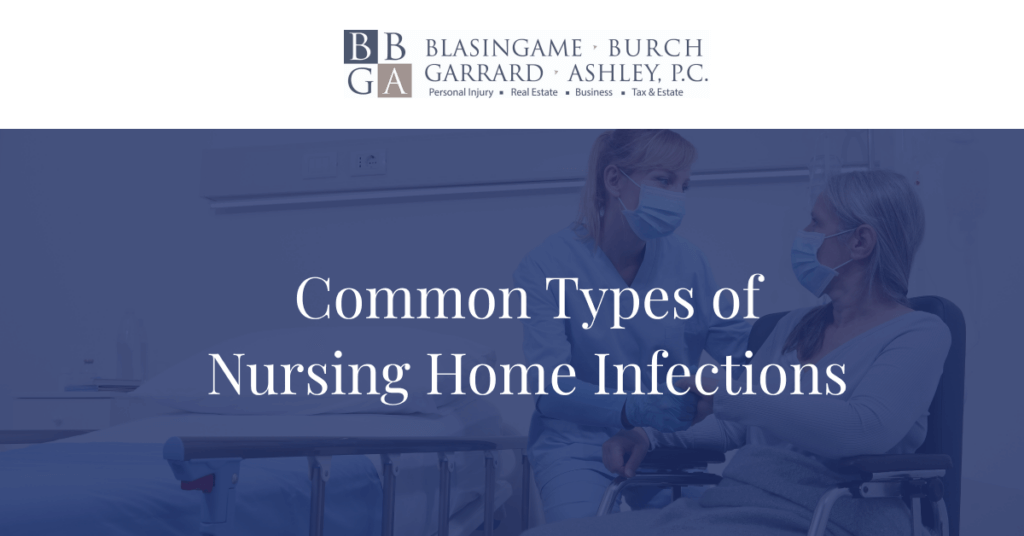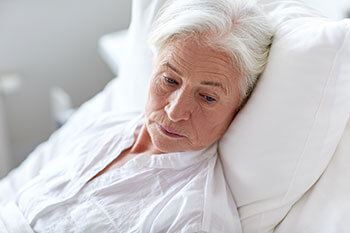Common Nursing Home Infections

According to the Georgia Department of Public Health (DPH), nursing home residents are at risk of Healthcare-associated infections (HAIs), which develop either during or soon after medical treatment for a separate medical issue.
These infections have been tied to exposure to bacteria during an invasive surgical procedure, either by contaminated equipment, an unsanitary environment, or dirty hands.
For a free consultation with our Georgia nursing home abuse lawyers, please call (706) 354-4000 or reach us online today.
Common Georgia Nursing Home Infections
Urinary Tract Infections (UTIs)
Symptoms of a UTI may include frequent urination, burning pain during urination, and stomach pain.
But with an elderly person, a UTI may be harder to detect, especially if the person has other health issues or suffers from Alzheimer’s Disease or dementia.
Other symptoms to look for include:
- Fever
- Chills
- Back pain
- Kidney pain
- Nausea
- Vomiting
- Urine has a strong odor
- An urgent need to urinate
- Behavioral symptoms such as confusion or agitation
UTIs are commonly treated with antibiotics and orders to drink plenty of clear fluids to help flush the bacteria from the urinary tract. Changes in daily habits and hygiene can help prevent future infections.
Pneumonia

Pneumonia in the elderly can be lethal due to its rapid onset and ability to spread to other parts of the body. It also wreaks havoc on the immune system, which can exasperate an underlying condition or disease and cause a cycle of illness difficult to overcome.
A pneumonia infection attacks the air sacs in the lungs, causing them to swell, fill with fluids or pus, and cause a severe cough and difficulty breathing.
Community-acquired pneumonia is typically caused by bacteria, fungi, or viruses.
Symptoms to look for include:
- Cough
- Fever
- Chills
- Chest pain
- Fatigue
- Confusion
- Sweating
- Shaking
- Low body temperature
- Nausea/vomiting
- Diarrhea
- Shortness of breath
Staph
Staphylococcus aureus is a common bacteria found on the skin, but if it enters the body through a scrape, wound, or other lesion, it can cause a serious infection.
In nursing homes or other long-term care facilities, staph infections may become rampant if proper management techniques aren’t practiced, this is because it’s highly contagious and can be spread through clothing, bedding, medical equipment, and person-to-person.
Some symptoms to look out for include:
- A bump or skin lesion that won’t heal
- Swelling
- Boils/Blisters/Ulcers
- Fever
- Rash
- Nausea
- Diarrhea
- Muscle aches
- Joint aches
- Confusion
- Abdominal pain
Get a Free Case Review
Do you have questions about a nursing home abuse claim in Georgia? If so, simply submit the short form below to speak with an experienced attorney from BBGA about your case.
Methicillin-resistant Staphylococcus aureus (MRSA)
MRSA is a type of staph that’s resistant to most antibiotics. People who live in close living quarters, who have recently undergone a surgical procedure, or who have an invasive medical device are more at risk of developing MRSA.
Influenza (flu)
According to the CDC, the influenza vaccination should be provided routinely to all residents and staff of long-term care facilities. This helps prevent an outbreak.
If someone at the facility does test positive for the flu, outbreak prevention and control measures should be implemented immediately and all residents who have confirmed or suspected flu should receive antiviral treatment.
The flu can further complicate underlying conditions or lead to pneumonia, asthma attacks, ear infections, or bronchitis.
Symptoms of the flu may include:
- Fever
- Headache
- Cough
- Congestion
- Sore throat
- Chills
- Fatigue
- Vomiting
- Diarrhea
- Muscle or body aches
- Runny or stuffy nose
- Shortness of breath
Bedsores
Bedsores, or pressure injuries, cause damage to the skin and sometimes the tissue over a bony area. Bedsores are the result of prolonged pressure in one area of the body, typically from sitting or lying in the same place for extended periods of time without moving.
Read more about bedsores here.
Clostridium Difficile (C. difficile)
C. diff is a bacterium that causes inflammation of the colon. People older than 65 who live in long-term care facilities and who have been treated with antibiotics are more at risk of contracting C. diff.
According to the CDC, about half-a-million Americans contract C. diff each year and the infections have grown increasingly severe and more difficult to treat.
Symptoms of C. diff include:
- Watery diarrhea
- Abdominal cramps
- Swollen abdomen
- Dehydration
- Fever
- Rapid heartrate
- Nausea
- Loss of appetite
- Weight loss
- Increased white blood cell count
- Blood or pus in stool
- Kidney failure
Scabies
Scabies is a highly contagious rash caused by skin mites that can be transferred by direct contact, clothing, bedding, towels, or other linens.
Scabies can also be transferred by sexual contact. The mites burrow into the skin of the infected person and cause intense itching.
Scabies is an epidemic in nursing homes, long-term care facilities, hospitals, and other facilities.
Symptoms of scabies can include:
- Skin rash of small red bumps
- Blisters
- Bleeding wounds
- Intense scratching, which can further complicate infections
- Itching is worse at night
Sepsis
Sepsis is a life-threatening condition brought on by an infection. When sepsis occurs, chemicals are released into the bloodstream to help fight the infection, which triggers an inflammatory response that can damage internal organs, causing them to fail.
Sepsis can happen to anyone, but it’s most dangerous in the elderly and those with weakened immune systems.
Symptoms of sepsis include:
- High fever
- Rapid breathing
- Sweating
- Increased heartrate
- Slurred speech
- Dizziness
- Diarrhea
- Vomiting
- Low urine output
- Cold/clammy skin
- Loss of consciousness
- Pale skin/bad blood circulation
Risk Factors for Infections in the Elderly
- Close living quarters such as nursing homes, assisted-living facilities, or other long-term care facilities
- Weakened immune system
- Frequent visits to the hospital or other medical facility
- Alzheimer’s, dementia, or other diseases that make it difficult to communicate
- Use of antibiotics
- Underlying illnesses
- Chronic diseases
- Following a surgical procedure
- Invasive medical devices
- Bad circulation
- Obesity
- Tissue damage
- Malnutrition
Are There Common Infections Caused By Neglect?
Nursing homes and other long-term care facilities are responsible for preventing, identifying, and containing the spread of infections.
If nursing home residents have chronic infections, infections are widespread amongst residents, or unusual or deadly infections are present, it may be a sign of negligence, neglect, or abuse.
While infections in nursing homes are common, it is the facility’s responsibility to manage the spread of infections promptly and efficiently.
Contact a Georgia Nursing Home Abuse Attorney
If you or your loved one has contracted an infection at a nursing home or other long-term care facility, and you suspect negligence or abuse on the part of the facility, contact us immediately at (706) 354-4000 or send an online message for a free consultation.
